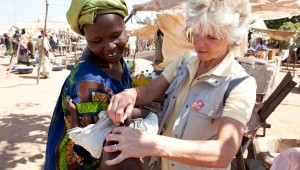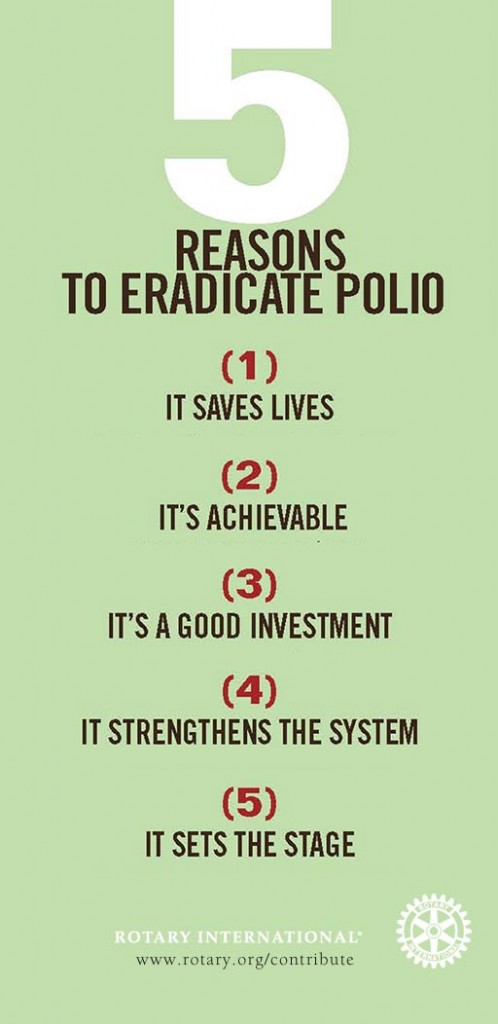One Woman’s Inspiring Quest to End Polio
The following is a post sponsored by Rotary International. For our sponsored post policy, click here.
Last month, we shared a few facts on how insanely close (*this close*) we are at eradicating polio altogether. And today in recognition of Rotary celebrating 108 years of humanitarian service this week—including their work to end polio, we’re sharing an incredibly inspiring and touching story about one woman’s personal quest to finish the fight to end this crippling disease. Having suffered from polio since she has a child, Ann Lee Hussey has made it her mission to do what she can to prevent anyone else from having to go through what she has. In addition to helping spread the word about ending polio, we guarantee that reading our Q&A with her will inspire you to get out there, do your best and make a difference—no matter what obstacles you’re facing.
Interview with Ann Lee Hussey, Rotarian and Polio Survivor
1. If you could tell everyone one thing about polio, what would it be? Polio, a cruel crippler, is totally preventable; please vaccinate your children, no matter where you live in the world.
2. How has having polio affected your life—both as a child and as an adult? As a child, I think having polio shaped my adult life, though when one is young, you are not necessarily thinking that way. Peers can be mean, as many children, unfortunately, learn. Childhood taught me to try no matter what. If I was physically incapable, then I discovered other ways to participate. I accepted early that I was different, and in the end, it has been exceptionally good to be.
As an adult, polio has helped me find myself. I do not wish to be defined by my polio but by my ability to do something with it. I feel my work in the field of eradication has been my way of giving back. Not only have I saved the lives of many children through vaccination, I have helped to create a greater awareness and more importantly have inspired others to do more. My work takes me to areas with great needs in the developing world resulting in several projects to bring clean water, education and mobility to hundreds. My greatest assets are determination and resilience. I make it a point to smile at others and to speak to them whenever possible; such a tiny gesture can improve anyone’s day.
3. How has exercise and diet played a role in your condition? What workouts and healthy foods make you feel good? I feel that exercise and diet play a key role in everyone’s condition. For me, staying slim is a lifesaver for my feet, legs and back. I have, on occasion carried 10 to 20 pounds more weight; the difference is remarkable. Strength training (resistance machines) makes me feel the best and look my best. It also maintains bones and muscles to lessen falls. Swimming is also a favorite, especially because the buoyancy allows me more freedom, making it easier to move. Diet wise, I look for protein primarily through vegetables, eggs and fish, rather than red meats. I allow myself a sugar-sweet treat occasionally, though not every week.
4. How did you get involved with the End Polio campaign with Rotary? My husband introduced me to Rotary and learning of Rotary’s goal to eradicate polio intrigued me. No one spoke about polio in my area anymore, similar to the mindset of many in our country today.
The opportunity arose for me to travel to India, as a non-Rotarian, in January 2001. There I saw polio survivors crawling and begging in the streets, hundreds of them. Their legs twisted in unimaginable contortions, many walking on both hands and feet like animals, stripped of their dignity. And as I have said countless times before, I felt blessed to have had polio in the USA, rather than in the slums of India. On that same trip I met a 9-year-old schoolgirl with the same thin right leg and the same heavy metal brace that I used to wear, and I was instantly overwhelmed with memories of myself at her age. That moment was a turning point for me, and I decided right then I wanted to help in the eradication program in any way I could until polio is no more.
5. Of all of the work you’ve done to vaccinate children, does one memory stand out as the strongest? That is a difficult question, there have been so many priceless experiences. I will give you one of my more recent, September 2010 in Nigeria. I was immunizing with Nigerian Rotarians covering street by street.
We were invited into a small school, a classroom really, consisting of one room with sitting benches lining the walls. When we walked in, the children jumped up excitedly to see us but soon the teacher had them positioned back onto the crowded benches, and I began to immunize. Each little one opened their mouth like a feeding bird to take the precious drops of vaccine. They knew the routine. One little boy kept leaving his seat and came to me, tugging at my pant leg. Every time, the teacher would send him back to his seat and ask him to wait. Soon, I was on his side of the room, and then it was his turn. Turning his head up, he looked into my eyes and dutifully swallowed the drops, never taking his eyes off mine and said, “I love you, Auntie.” And yes, I melted. My friends were speechless. I scooped the little guy up and, hugging him, whispered “I love you” into his ear.
There are so many similar moving experiences that make it all worthwhile. All the money in the world cannot buy such a reward.
6. Many times you have to travel to dangerous areas for your advocacy work. How do you deal with that fear? I concentrate on my focus and the many experiences shared with the local community. I place my trust in Rotarian friends everywhere I travel. If I allowed myself to feel afraid, I would never travel. Travel for me has been an education and a blessing. I have so many wonderful friends!
7. What’s the best piece of advice you’ve ever received and why? Be yourself. This has allowed me to grow and flourish.
8. What’s the best piece of advice you can give to others? Find your passion, aim high! Reach out and help others—you will benefit as much, probably more, than the ones you help.
9. Anything else you’d like to add? Please support Rotary’s efforts to eradicate polio. Learn about our program at endpolionow.org. And explore Rotary—we are a unique NGO, offering all an opportunity to serve others. In Rotary, there is something of interest for everyone. Learn more at rotary.org.
Inspiring, right?! And just a few facts on what Ms. Hussey and Rotary volunteers all over the world have done (spoiler: it’s a lot!):
- Rotary is celebrating 108 years of humanitarian service.
- When Rotary began the fight to end polio in 1985, nearly 350,000 cases of polio were reported in 125 countries every year.
- The number of polio cases has plummeted by more than 99 percent.
- Rotary and its members have contributed more than $1 billion to the fight to end polio. Polio would be only the second human disease ever eradicated.
- The year 2012 ended with the fewest wild polio cases, in the fewest places ever in history.
Want to do your part to help? Petition to mobilize support and advocacy from world leaders here and join the World’s Biggest Commercial here. And be sure to follow #endpolio on Twitter, too! —Jenn


